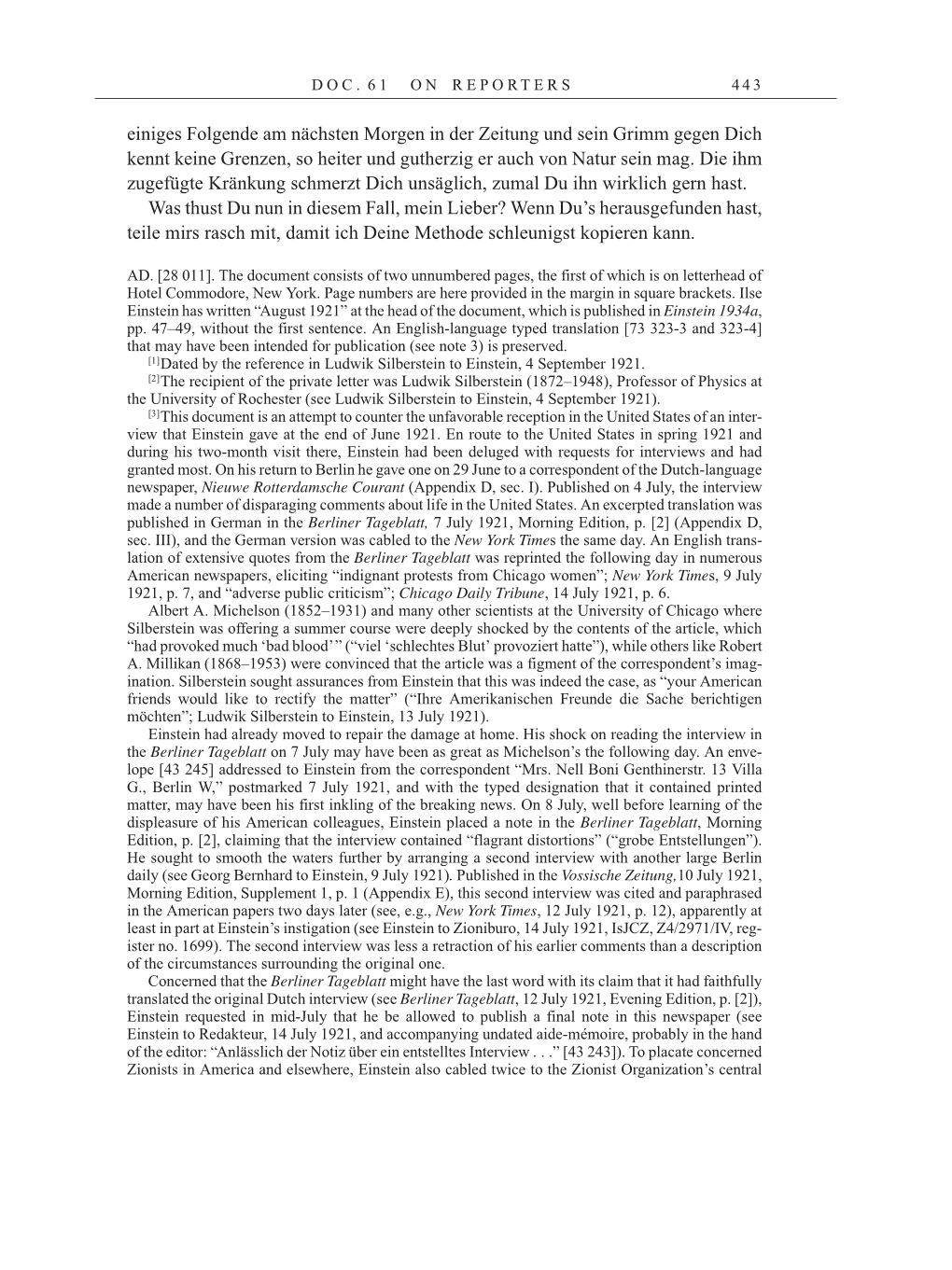D O C . 6 1 O N R E P O R T E R S 4 4 3
einiges Folgende am nächsten Morgen in der Zeitung und sein Grimm gegen Dich
kennt keine Grenzen, so heiter und gutherzig er auch von Natur sein mag. Die ihm
zugefügte Kränkung schmerzt Dich unsäglich, zumal Du ihn wirklich gern hast.
Was thust Du nun in diesem Fall, mein Lieber? Wenn Du’s herausgefunden hast,
teile mirs rasch mit, damit ich Deine Methode schleunigst kopieren kann.
AD. [28 011]. The document consists of two unnumbered pages, the first of which is on letterhead of
Hotel Commodore, New York. Page numbers are here provided in the margin in square brackets. Ilse
Einstein has written “August 1921” at the head of the document, which is published in Einstein 1934a,
pp. 47–49, without the first sentence. An English-language typed translation [73 323-3 and 323-4]
that may have been intended for publication (see note 3) is preserved.
[1]Dated by the reference in Ludwik Silberstein to Einstein, 4 September 1921.
[2]The recipient of the private letter was Ludwik Silberstein (1872–1948), Professor of Physics at
the University of Rochester (see Ludwik Silberstein to Einstein, 4 September 1921).
[3]This document is an attempt to counter the unfavorable reception in the United States of an inter-
view that Einstein gave at the end of June 1921. En route to the United States in spring 1921 and
during his two-month visit there, Einstein had been deluged with requests for interviews and had
granted most. On his return to Berlin he gave one on 29 June to a correspondent of the Dutch-language
newspaper, Nieuwe Rotterdamsche Courant (Appendix D, sec. I). Published on 4 July, the interview
made a number of disparaging comments about life in the United States. An excerpted translation was
published in German in the Berliner Tageblatt, 7 July 1921, Morning Edition, p. [2] (Appendix D,
sec. III), and the German version was cabled to the New York Times the same day. An English trans-
lation of extensive quotes from the Berliner Tageblatt was reprinted the following day in numerous
American newspapers, eliciting “indignant protests from Chicago women”; New York Times, 9 July
1921, p. 7, and “adverse public criticism”; Chicago Daily Tribune, 14 July 1921, p. 6.
Albert A. Michelson (1852–1931) and many other scientists at the University of Chicago where
Silberstein was offering a summer course were deeply shocked by the contents of the article, which
“had provoked much ‘bad blood’” (“viel ‘schlechtes Blut’ provoziert hatte”), while others like Robert
A. Millikan (1868–1953) were convinced that the article was a figment of the correspondent’s imag-
ination. Silberstein sought assurances from Einstein that this was indeed the case, as “your American
friends would like to rectify the matter” (“Ihre Amerikanischen Freunde die Sache berichtigen
möchten”; Ludwik Silberstein to Einstein, 13 July 1921).
Einstein had already moved to repair the damage at home. His shock on reading the interview in
the Berliner Tageblatt on 7 July may have been as great as Michelson’s the following day. An enve-
lope [43 245] addressed to Einstein from the correspondent “Mrs. Nell Boni Genthinerstr. 13 Villa
G., Berlin W,” postmarked 7 July 1921, and with the typed designation that it contained printed
matter, may have been his first inkling of the breaking news. On 8 July, well before learning of the
displeasure of his American colleagues, Einstein placed a note in the Berliner Tageblatt, Morning
Edition, p. [2], claiming that the interview contained “flagrant distortions” (“grobe Entstellungen”).
He sought to smooth the waters further by arranging a second interview with another large Berlin
daily (see Georg Bernhard to Einstein, 9 July 1921). Published in the Vossische Zeitung,10 July 1921,
Morning Edition, Supplement 1, p. 1 (Appendix E), this second interview was cited and paraphrased
in the American papers two days later (see, e.g., New York Times, 12 July 1921, p. 12), apparently at
least in part at Einstein’s instigation (see Einstein to Zioniburo, 14 July 1921, IsJCZ, Z4/2971/IV, reg-
ister no. 1699). The second interview was less a retraction of his earlier comments than a description
of the circumstances surrounding the original one.
Concerned that the Berliner Tageblatt might have the last word with its claim that it had faithfully
translated the original Dutch interview (see Berliner Tageblatt, 12 July 1921, Evening Edition, p. [2]),
Einstein requested in mid-July that he be allowed to publish a final note in this newspaper (see
Einstein to Redakteur, 14 July 1921, and accompanying undated aide-mémoire, probably in the hand
of the editor: “Anlässlich der Notiz über ein entstelltes Interview . . .” [43 243]). To placate concerned
Zionists in America and elsewhere, Einstein also cabled twice to the Zionist Organization’s central
